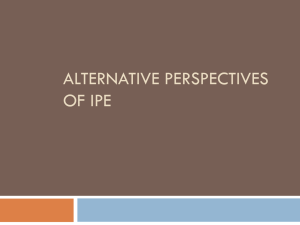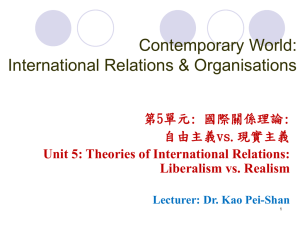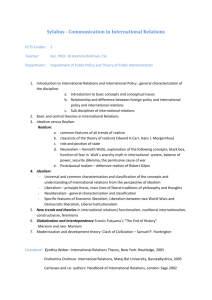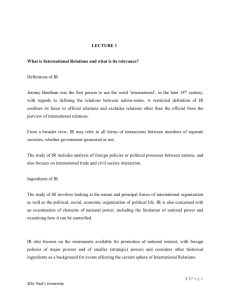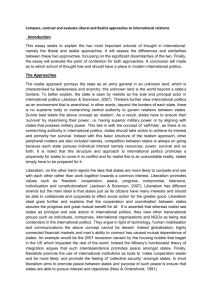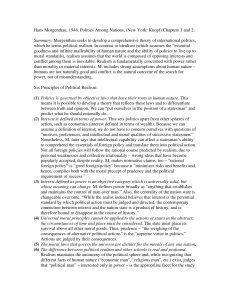POL 223: International Relations
advertisement
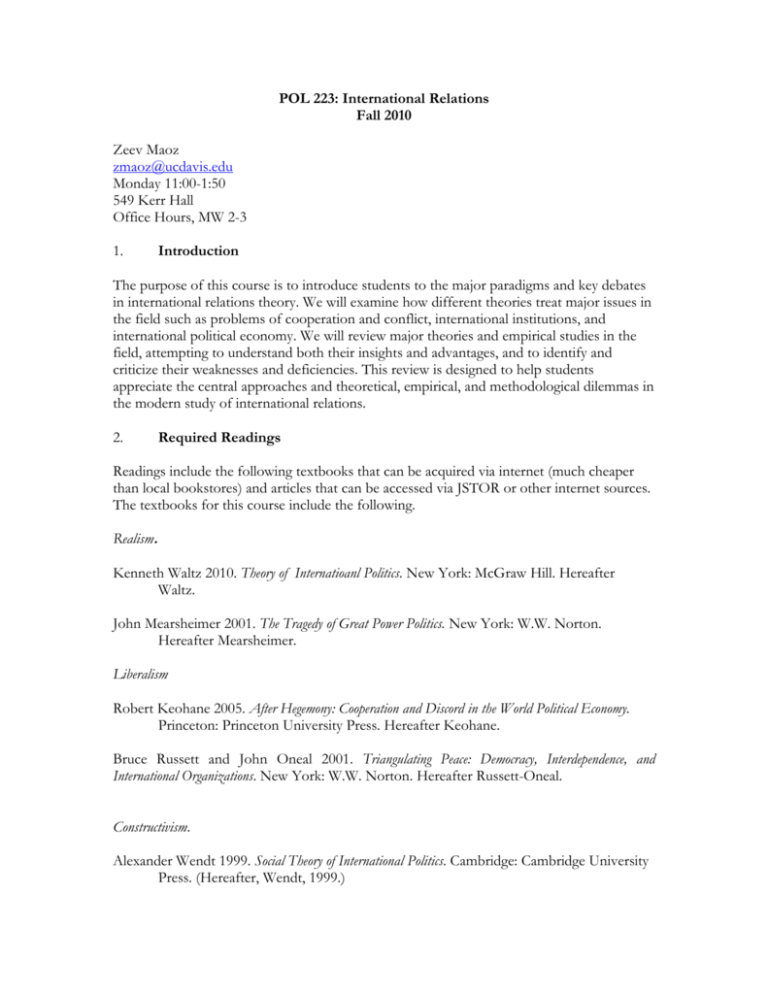
POL 223: International Relations Fall 2010 Zeev Maoz zmaoz@ucdavis.edu Monday 11:00-1:50 549 Kerr Hall Office Hours, MW 2-3 1. Introduction The purpose of this course is to introduce students to the major paradigms and key debates in international relations theory. We will examine how different theories treat major issues in the field such as problems of cooperation and conflict, international institutions, and international political economy. We will review major theories and empirical studies in the field, attempting to understand both their insights and advantages, and to identify and criticize their weaknesses and deficiencies. This review is designed to help students appreciate the central approaches and theoretical, empirical, and methodological dilemmas in the modern study of international relations. 2. Required Readings Readings include the following textbooks that can be acquired via internet (much cheaper than local bookstores) and articles that can be accessed via JSTOR or other internet sources. The textbooks for this course include the following. Realism. Kenneth Waltz 2010. Theory of Internatioanl Politics. New York: McGraw Hill. Hereafter Waltz. John Mearsheimer 2001. The Tragedy of Great Power Politics. New York: W.W. Norton. Hereafter Mearsheimer. Liberalism Robert Keohane 2005. After Hegemony: Cooperation and Discord in the World Political Economy. Princeton: Princeton University Press. Hereafter Keohane. Bruce Russett and John Oneal 2001. Triangulating Peace: Democracy, Interdependence, and International Organizations. New York: W.W. Norton. Hereafter Russett-Oneal. Constructivism. Alexander Wendt 1999. Social Theory of International Politics. Cambridge: Cambridge University Press. (Hereafter, Wendt, 1999.) POL 223 2 General Methodology in International Relations Zeev Maoz, Alex Mintz, T. Clifton Morgan, Glenn Palmer, and Richard J. Stoll (Eds.) 2004. Multiple Paths to Knowledge in International Relations. Lanham, MD: Lexington Press. (Hereafter, Maoz et al., 2004.) 3. Course Structure After the first week—which will consist of a general introduction to the course and the readings—we will spend two weeks on each of the central paradigms. The second week will be structured as a mock trial: an indictment of the paradigm is presented in the detailed course schedule. One student will be a prosecutor, one will serve as a defense attorney, and one will be the judge. Each role will be accompanied by a brief. The prosecutor will make arguments—supported by evidence from the readings—for a guilty verdict. The defense attorney will make the case for acquittal. The judge will explain the verdict on the basis of the arguments and evidence made by the prosecution and the defense. Students will rotate roles from one mock trial to the other. We will have a total of four mock trials. 4. Course Requirements The course requirements include the following: 1. 2. 3. 5. Theory briefs: 3 15% = 45% Class participation and presentation: 15% Final Review Paper—20-30 page literature review paper on a topic of the student’s choice (and my approval of the topic): 40%. Course Schedule Week 1: General Introduction Topics for Discussion: What is International Relations (IR)? How does it build on and differ from other fields in political science? What are the key characteristics of IR? What are the key fault lines in the field? Levels of analysis in the study of IR Methodology and IR Overview of the course Week 2: Realist Theories of IR Topics for Discussion: Fundamental assumptions of realism Classical Realism versus Neo-realism—commonalities and differences POL 223 3 Varieties of realism—defensive vs. offensive, structural versus “reductionist” What made realism so attractive to so many for such a long time? Central criticisms of realism Required Readings: Waltz, 2010. Entire book. Mearsheimer 2001. Chapters 1-3, 5, 8-10. Charles L. Glaser 1994/5. Realists as Optimists: Cooperation as Self-Help. International Security, 19(3): 50-90. Recommended Readings: Evan Braden Montgomery 2006. Breaking Out of the Security Dilemma: Realism, Reassurance, and the Problem of Uncertainty. International Security, 31(2): 151-185. Robert Jervis 1978. Cooperation under the Security Dilemma. World Politics¸30(2): 167-214. Stephen M. Walt 2002. The Enduring Relevance of the Realist Tradition. In Ira Katznelson and Helen M. Milner (Eds.). Political Science: The State of the Discipline. New York: W.W. Norton. Week 3: The Trial of Realist Theories of IR Topics for Discussion: Is realism internally consistent? Is realism a progressive or degenerative paradigm? Realism and empirical research. The trial of realism: Indictment o Realist theory misrepresents the “true” nature of international relations o Realism is a self-perpetuating prescription for aggressive policies o Realists are not to be confused by facts—no matter what empirical studies show, realist re-adjust their theory so it cannot be refuted The prosecution’s closing argument The defense’s closing argument Required Readings: Bruce Bueno de Mesquita 2002. Neorealism’s Logic and Evidence: When is a Theory Falsified? In John A. Vasquez and Collin Elman (Eds.). Realism and the Balancing of Power: A New Debate. Englewood Cliffs, NJ: Prentice Hall. John A. Vasquez 1997. Progressive Research on Degenerative Alliances. American Political Science Review, 91(4): 919-926. Walt, Stephen M. 1997. The Progressive Power of Realism. American Political Science Review, 91(4): 931-935. Thomas J. Christensen and Jack Snyder 1997. Progressive Research on Degenerate Alliances. American Political Science Review, 91(4): 919-922. Collin Elman and Miriam Fendius Elman 1997. Lakatos and Realism: A Reply to Vasquez. American Political Science Review, 91(4): 923-926. Waltz, Kenneth N. 1997. Evaluating Theories. American Political Science Review, 91(4): 912-917. (Note: All these articles are also available in the Vasquez and Elman book.) POL 223 4 Recommended Readings: Robert O. Keohane (Ed.) 1986. Neorealism and Its Critics. New York: Columbia University Press. Chapters by Keohane, Ruggie, Cox and concluding chapter by Waltz. John A. Vasquez 1998. The Power of Power Politics. Cambridge: Cambridge University Press. Week 4: Liberalism and Institutionalism Topics for Discussion: The Judge’s verdict on the Realist Paradigm Central assumptions of the liberal paradigm Overlap and contradiction between liberalism and realism Varieties of liberalism—micro versus institutional liberalism Domestic politics as liberal theory Liberalism and idealism Offensive liberalism? Required Readings: Keohane, 2005. Chs. 1, 2, 6, 7, 11. Robert O. Keohane and Lisa L. Martin 1995. The Promise of Institutionalist Theory. International Security, 20(1): 39-51. Russett and Oneal 2001. Entire book. Benjamin Miller 2010. Democracy Promotion: Offensive Liberalism versus the Rest (of IR Theory). Millenium 38(3): 561-591. Recommended Readings: Robert O. Keohane and Joseph S. Nye 1977. Power and Interdependence: World Politics in Transition. Englewood Cliffs, NJ: Prentice Hall. Joseph S. Nye 2004. Soft Power: The Means to Success in World Politics. Washington, D.C.: Public Affairs. Week 5: The Trial of the Liberal Paradigm Topics for Discussion: Is liberalism a cover for misplaced idealism? Liberalism and dependency Liberalism and Western biases The Prosecution Case against Liberalism o Institutions are ineffective—cannot override national interests o The democratic peace is a fluke—it is due to spurious inference or to a statistical artifact o Liberalism may lead to dangerous illusions (e.g., making the world safe for democracy) The Defense’s Closing Arguments for Liberalism Required Readings: John J. Mearsheimer 1994/95. The False Promise of International Institutions. International Security, 19(3): 5-49. POL 223 5 Andrew Moravcsik 1997. Taking Preferences Seriously: A Liberal Theory of International Politics. International Organization, 51(4): 513-553. Joanne Gowa 1999. Ballots and Bullets: The Elusive Democratic Peace. Princeton: Princeton University Press. Edward D. Mansfield and Jack Snyder 2005. Electing to Fight: Why Emerging Democracies Go to War. Cambridge, MA: MIT Press. Chapters 1-3, conclusion. Recommended Readings: Jennifer Sterling-Volker 2000. Competing Paradigms or Birds of a Feather? Constructivism and Neoliberal Institutionalism Compared. International Studies Quarterly, 44(1): 97119. Week 6: Constructivism 101 Topics for discussion: Where do interests come from? The “real world” as social construction—the relationship between ideas and action Can states have identities? What are the components of identity in IR? Interaction-based identity: what does that mean? International cultures—what are they and how do we know they exist? Required Readings: Wendt, 1999, entire book. Recommended Readings: Alexander Wendt 1992. Anarchy is What States Make of It. International Organization, 46(2): 391-425. Ronald L. Jepperson, Alexander Wendt, and Peter J. Katzenstein 1996. Norms, Identity, and Culture in National Security. In Peter J. Katzenstein (ed.). The Culture of National Security. New York: Columbia University Press, pp. 33-78. Week 7: Constructivism Under the Microscope—What does it tell us about IR? Topics for Discussion: Is constructivism a theory? Constructivism and perception The prosecution’s case against constructivism o Identity, Ideas, and actions—the chicken and two eggs? Circular logic in constructivist theories? o How does constructivism differ from psychological theories of politics o Can constructivist ideas be tested empirically? Why does constructivism reject positivism? o How is constructivism different from realism or liberalism The defense’s closing arguments for constructivism Required Readings: Immanuel Adler 1997. Seizing the Middle Ground: Constructivism in World Politics. European Journal of International Relations, 3(3): 319-363. POL 223 6 Vincent Pouliot 2007. Sobjectivism: Towards a Constructivist Methodology. International Studies Quarterly, 51(3): 359-384. Robert Jervis 1998. Realism and the Study of World Politics, International Organization, 52(4): 971-991. Ted Hopf 1998. The Promise of Constructivism in International Relations Theory. International Security, 23(1): 171-200. Recommended Readings: Jennifer Milliken 1999. The Study of Discourse in International Relations: A Critique of Research and Methods. European Journal of International Relations, 5(2): 225-254. Jeffrey T. Checkel 1998. National Interests in International Society, World Politics, 90(2): 324362. Week 8: Some Reductionist Approaches to IR Topics for Discussion: Foreign Policy Making: Decision Theoretic Models and International Relations Bargaining Approaches to IR The practice of IR: Diplomacy and Negotiation Domestic politics and IR Required Readings: Bruce Russett 1995. Processes of Dyadic Choice for War and Peace. World Politics, 47(2): 268-282. Zeev Maoz 1990. National Choices and International Processes. Cambridge: Cambridge University Press, pp. 1-49, 531-565. James D. Fearon 1994. Rationalist Explanations for War. International Organization, 49(3): 379414. Jack S. Levy 1988. Domestic Politics and War. Journal of Interdisciplinary History¸18(4): 653-673. Week 9: International Political Economy (IPE) Topics for Discussion: Where do economics end and politics start (or vice versa)? Realist, liberal, and Marxist approaches to IPE Trade and international politics—the Interdependence-Conflict nexus Regime literature and international relations Required Readings: Robert Gilpin 2001. Global Political Economy: Understanding the International Economic Order. Princeton: Princeton University Press, pp. Zeev Maoz 2009. The Effects of Strategic and Economic Interdependence on International Conflict across Levels of Analysis. American Journal of Political Science, 53(1): 223-240. Daniel Y. Kono 2006. Optimal Obfuscation: Democracy and Trade Policy Transparency. American Political Science Review, 100(3): 369-384. Stephan Haggard and Beth A. Simmons 1987. Theories of International Regimes, International Organization, 41(3): 491-517. POL 223 7 Week 10: Methodology in International Relations Research Topics for Discussion: The Quantitative-Qualitative Debate The Formal Theory-Empiricist Debate The Rationalist-Other Debate Different approaches and different answers—do we look for the loss where the light is? Required Readings Maoz et al. 2004. Entire book. Andrew Bennett and Collin Elman 2006. Qualitative Research: Recent Development in Case Study Methods. Annual Review of Political Science, 9: 455-476. Final Paper Due.
